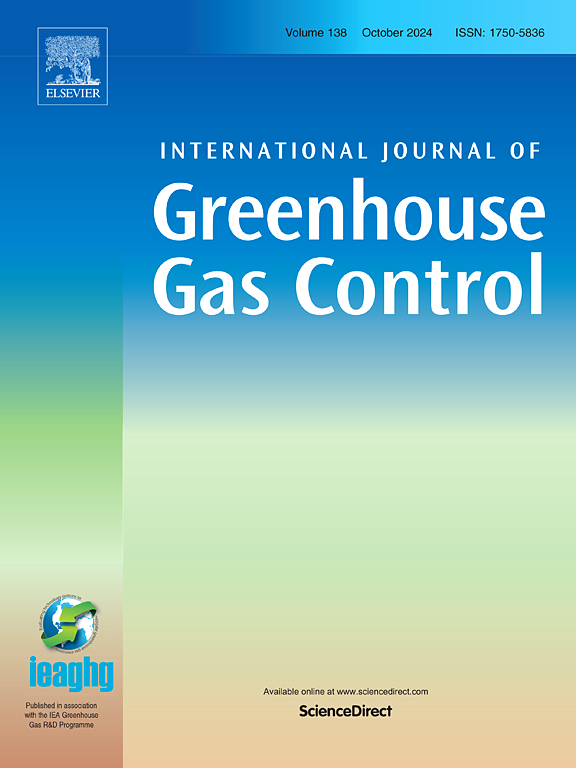A novel efficiency-based, tiered carbon storage incentive approach for CCUS through CO2 enhanced oil recovery and storage
IF 5.2
3区 工程技术
Q2 ENERGY & FUELS
International Journal of Greenhouse Gas Control
Pub Date : 2025-03-24
DOI:10.1016/j.ijggc.2025.104362
引用次数: 0
Abstract
Carbon Capture, Utilization, and Storage (CCUS) through CO2 Enhanced Oil Recovery (CO2-EOR) supports energy production while reducing atmospheric CO2 emissions. Economic profitability, not environmental effectiveness, typically drives operators’ decisions. The objective of this paper is to examine the relationship between economic and environmental benefits under various flood designs (continuous CO2 injection and Water-Alternating-Gas (CO2-WAG) injection scenarios) and economic conditions, proposing operational and policy solutions to simultaneously optimize both. Net CO2 emissions and Net Present Value (NPV) serve as indicators of environmental and economic outcomes, respectively. We integrate a reservoir simulation, a life cycle emissions analysis, and an economic model.
Results show that continuous CO2 injection maximizes environmental benefits. Without carbon storage incentives, economic and environmental gains are misaligned, with operators favoring practices that maximize net CO2 emissions. A dynamic breakeven carbon storage incentive, sensitive to oil prices and CO2 acquisition costs, is essential for alignment. Incentives below breakeven improve economic profitability with limited environmental gains. Operator responsibility for mitigating climate change, along with CO2 availability, also influences this alignment. Uniform incentive systems, such as the 45Q tax credit system in the U.S., present challenges, often requiring unrealistically high incentives and tying total incentives to the volume of net CO2 stored, rather than the actual environmental impact. To address these issues, we propose a novel alternative tiered, performance-based metric that directly links incentives to environmental outcomes through storage efficiency, defined as the amount of CO₂ effectively stored after accounting for upstream, gate-to-gate, and downstream emissions per barrel of oil produced.
一种新型的基于效率的分层碳储存激励方法,通过提高二氧化碳的采收率和储储量
通过二氧化碳提高采收率(CO2- eor)支持能源生产,同时减少大气二氧化碳排放。驱动运营商决策的通常是经济效益,而不是环境效益。本文的目的是研究不同洪水设计(连续注入二氧化碳和水-气交替(CO2- wag)注入情景)和经济条件下的经济效益和环境效益之间的关系,并提出同时优化两者的操作和政策解决方案。净二氧化碳排放量和净现值(NPV)分别作为环境和经济结果的指标。我们整合了水库模拟、生命周期排放分析和经济模型。结果表明,连续注入二氧化碳可实现环境效益最大化。如果没有碳储存激励措施,经济效益和环境效益就会脱节,运营商会倾向于最大化二氧化碳净排放量的做法。一个对油价和二氧化碳获取成本敏感的动态盈亏平衡碳储存激励机制对于调整至关重要。低于盈亏平衡的激励措施提高了经济盈利能力,但环境收益有限。运营商减缓气候变化的责任,以及二氧化碳的可用性,也影响了这种一致性。统一的激励制度,如美国的45Q税收抵免制度,带来了挑战,通常需要不切实际的高激励,并将总激励与净二氧化碳储存量挂钩,而不是实际的环境影响。为了解决这些问题,我们提出了一种新的分层、基于绩效的替代指标,通过存储效率将激励与环境结果直接联系起来,存储效率的定义是考虑到每桶石油生产的上游、门到门和下游排放后有效存储的二氧化碳量。
本文章由计算机程序翻译,如有差异,请以英文原文为准。
求助全文
约1分钟内获得全文
求助全文
来源期刊
CiteScore
9.20
自引率
10.30%
发文量
199
审稿时长
4.8 months
期刊介绍:
The International Journal of Greenhouse Gas Control is a peer reviewed journal focusing on scientific and engineering developments in greenhouse gas control through capture and storage at large stationary emitters in the power sector and in other major resource, manufacturing and production industries. The Journal covers all greenhouse gas emissions within the power and industrial sectors, and comprises both technical and non-technical related literature in one volume. Original research, review and comments papers are included.

 求助内容:
求助内容: 应助结果提醒方式:
应助结果提醒方式:


